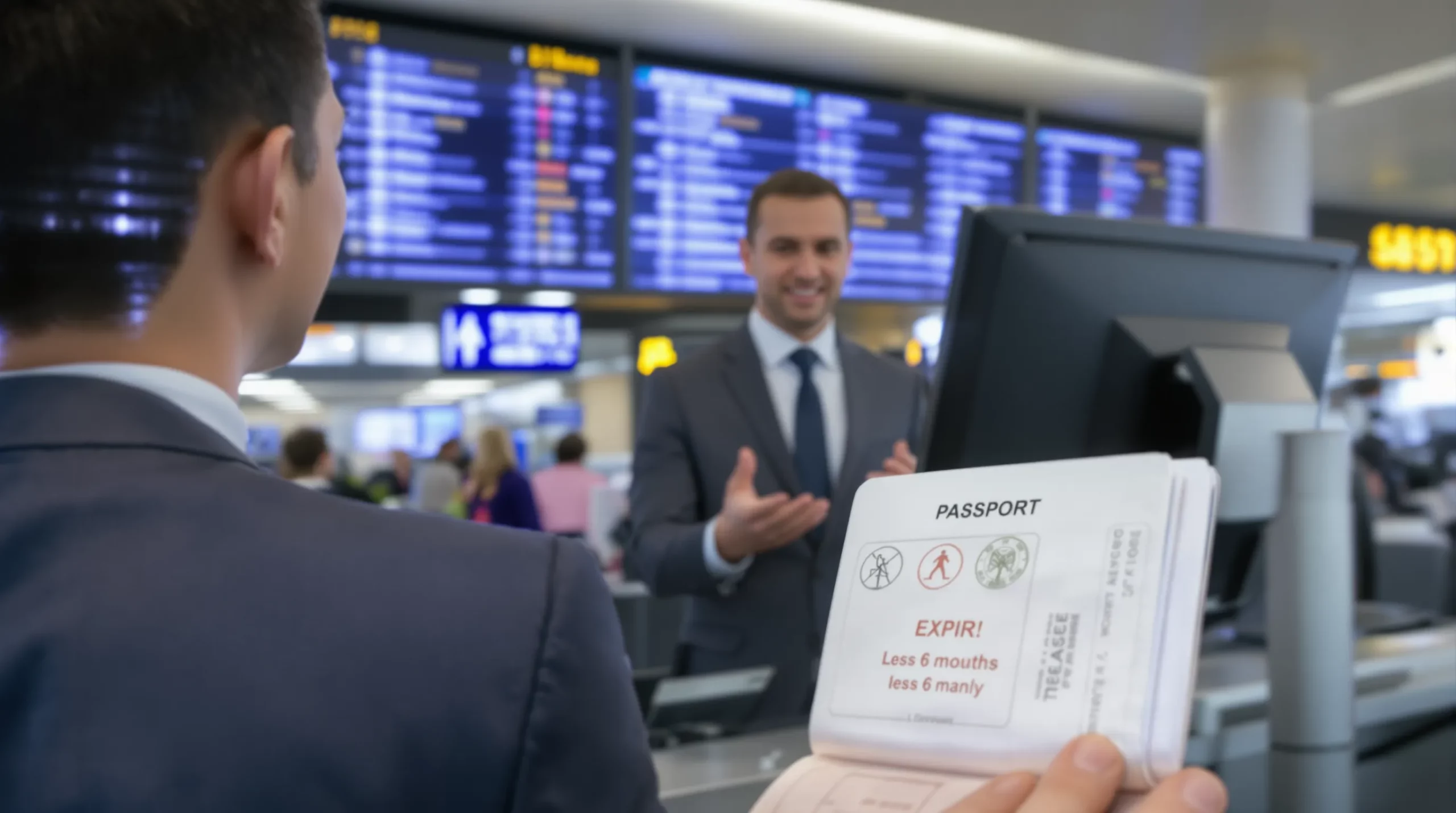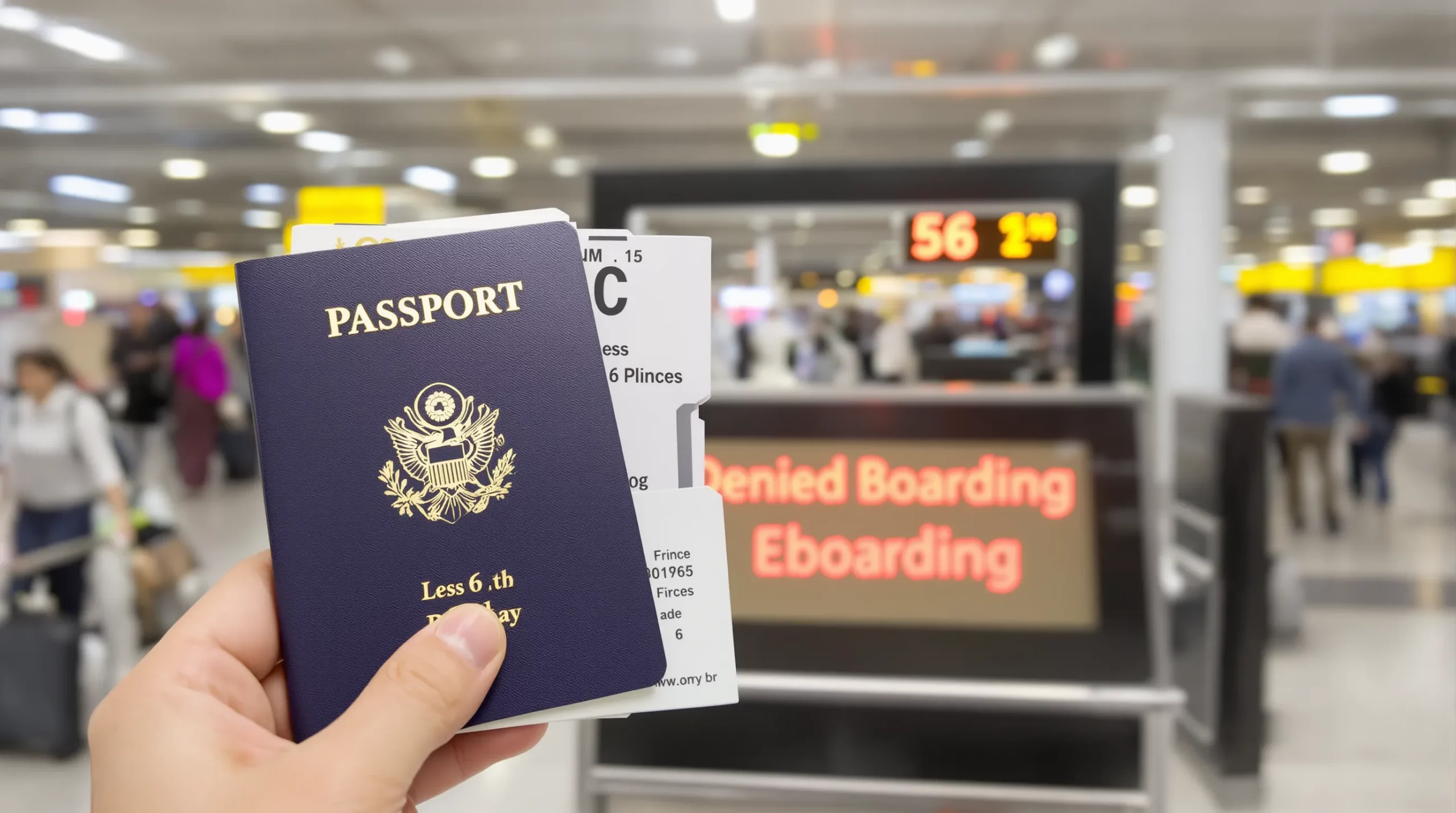The 6‑Month Passport Validity Rule: How It Affects Your Visa Application and Flights

Every year thousands of otherwise-prepared travelers are turned away at airline check-in because their passport is a few weeks too close to expiring. The culprit is the so-called 6-month passport validity rule. While not every country applies it, enough do that ignoring the rule can wreck your trip, void your non-refundable ticket, and even trigger an automatic visa rejection.
What Is the 6-Month Passport Validity Rule?
Most people notice the expiry date on the identity page of their passport. What many miss is that dozens of immigration authorities add a buffer. The 6-month rule states that, on the day you enter a country, your passport must still be valid for at least another six months. A few governments set slightly different buffers (three or four months), but six months is the most common threshold.
Key facts:
- The policy is imposed by destination countries, not airlines. Airlines simply enforce it to avoid government fines for boarding ineligible passengers.
- Rules are published in real time through databases such as IATA Timatic, which check-in agents and online travel systems consult.
- The requirement usually applies to all travelers, even those who can enter visa-free.
Why Do Governments Require Extra Validity?
- Overstay mitigation – if you arrive with only a few weeks of passport life left, you could remain in the country illegally after the document expires.
- Administrative buffer – lost or damaged passports during travel create major headaches for immigration services. Extending the validity window reduces risk.
- ICAO standards – many automated border gates need a minimum validity period to guarantee machine-readable integrity.
Countries and Regions That Enforce the Rule
Below is a non-exhaustive snapshot of popular destinations and their minimum passport validity at entry. Always verify the latest data: requirements can change with little notice.
| Destination | Minimum Validity Required | Notes |
|---|---|---|
| United Arab Emirates | 6 months | GCC nationals exempt |
| Indonesia | 6 months | Applies to both visas on arrival and eVisas |
| Kenya | 6 months | Checked again when extending an eVisa |
| Mexico | 6 months recommended (3 months accepted) | Airlines still follow 6-month policy for safety |
| Thailand | 6 months | Transit passengers included |
| Turkey | 6 months | Dual citizens entering on Turkish passport exempt |
| Schengen Area | 3 months beyond exit date | Rule codified in Schengen Borders Code |
| United Kingdom | Passport must be valid for stay (some visitors) but EU/US often advised 6 months | Check specific nationality |
| Australia | Passport must be valid for stay; airlines usually apply 6-month buffer | ETA applications fail below 6 months |
Data verified August 2025 via IATA Timatic and official government portals.
How the Rule Influences Visa Applications
-
Automatic filters inside eVisa platforms – Most electronic visa systems, including India, Kenya, and Saudi Arabia, will reject an application if your passport expires within six months of the submission date, not the travel date. You lose the fee and must reapply with a renewed passport.
-
Embassy stamping – For traditional sticker visas, consulates commonly demand six to twelve months of validity beyond visa expiry, a slightly different calculation that still makes short-dated passports a no-go.
-
Multi-year visas – If you apply for a five-year U.S. B-1/B-2 or Australian Visitor visa but your passport expires in eight months, the visa will be limited, or placed on a new passport later at additional cost.
Need a refresher on other document requirements? See our practical checklist at Checklist: Everything You Need Before Submitting an Online Visa Application.
Consequences for Flights and Boarding
Airlines are responsible for transporting only eligible passengers. If you present a passport with insufficient validity:
- Online check-in often fails silently – the system sees Timatic data and blocks boarding passes.
- At the airport the agent must refuse boarding, even if you hold a valid ticket, hotel booking, and return flight.
- Some carriers charge a no-show fee or cancel onward sectors.
For code-share itineraries it only takes one destination or transit country with a six-month rule to derail the trip.
Special Cases and Common Misunderstandings
- Schengen’s “3 months beyond exit” rule – many travelers still get caught because they miscalculate the exit date or forget about connecting flights through Europe.
- Minors’ passports – children’s passports often expire sooner (five years for U.S. citizens), so families should double-check.
- Dual citizenship – the rule applies to the passport you use to enter. If your second passport has longer validity, travel on that one.
- Domestic return flights – A short passport is no problem for flights back to your own country. Immigration officers where you land abroad are the gatekeepers, not your home border.
Timeline: Renewing Your Passport and Applying for Visas
| Months Before Departure | Recommended Action |
|---|---|
| 9–12 | Review passport expiry for all travelers. Book renewal appointment if validity at departure < 9 months. |
| 6–8 | Submit passport renewal (standard processing). Confirm receipt date to align with visa timeline. |
| 4–6 | Begin visa research. Use SimpleVisa’s visa-rules widget or API to pull exact requirements for each destination. |
| 3–4 | Submit eVisa or embassy application. Many systems automatically reject passports expiring in < 6 months. |
| 1–2 | Complete flight check-in eligibility test (most airlines allow a dry-run). Update passport details in booking records. |
| 0–1 | Travel with at least one printed and one digital copy of new passport and visa approvals. |
What If You Discover the Issue Last Minute?
- Expedited passport renewal – Many countries offer 24- to 72-hour emergency services for an extra fee. Appointments fill quickly; act immediately.
- Change travel dates or destinations – If renewal is impossible, choose a country that only requires validity for stay (e.g., Mexico, Costa Rica, South Korea for some nationals).
- Contact your airline – Some carriers will let you shift flights for a reduced change fee once you explain the passport problem.
How SimpleVisa Helps Travelers and Travel Brands
SimpleVisa’s rule engine surfaces passport validity requirements during the booking flow or in a white-label post-booking email. Here is how it protects customers and revenue:
- Automatic passport-expiry check alongside visa eligibility – no surprise denials at the airport.
- Smart reminders – configurable emails or SMS nudges at T-90, T-60, and T-30 days if passport renewal is recommended.
- One-click eVisa application once the traveler receives their new passport, capturing ancillary revenue for OTAs and airlines.
If you are an airline, OTA, or cruise line looking to embed these safeguards, explore the integration options outlined in API vs. White-Label App: Which Visa Integration Model Suits You?.

Key Takeaways
- Treat the six-month passport validity rule as a global default unless official sources say otherwise.
- A short-dated passport can derail both visa applications and airline boarding, even for visa-free trips.
- Renew passports at least nine months before departure to maintain flexibility and avoid expedited fees.
- Travel businesses can protect customers and unlock ancillary revenue by integrating real-time passport and visa checks with SimpleVisa.
Ready to remove document surprises from your next trip—or your customer’s next booking? Discover how SimpleVisa can simplify compliance in one call.